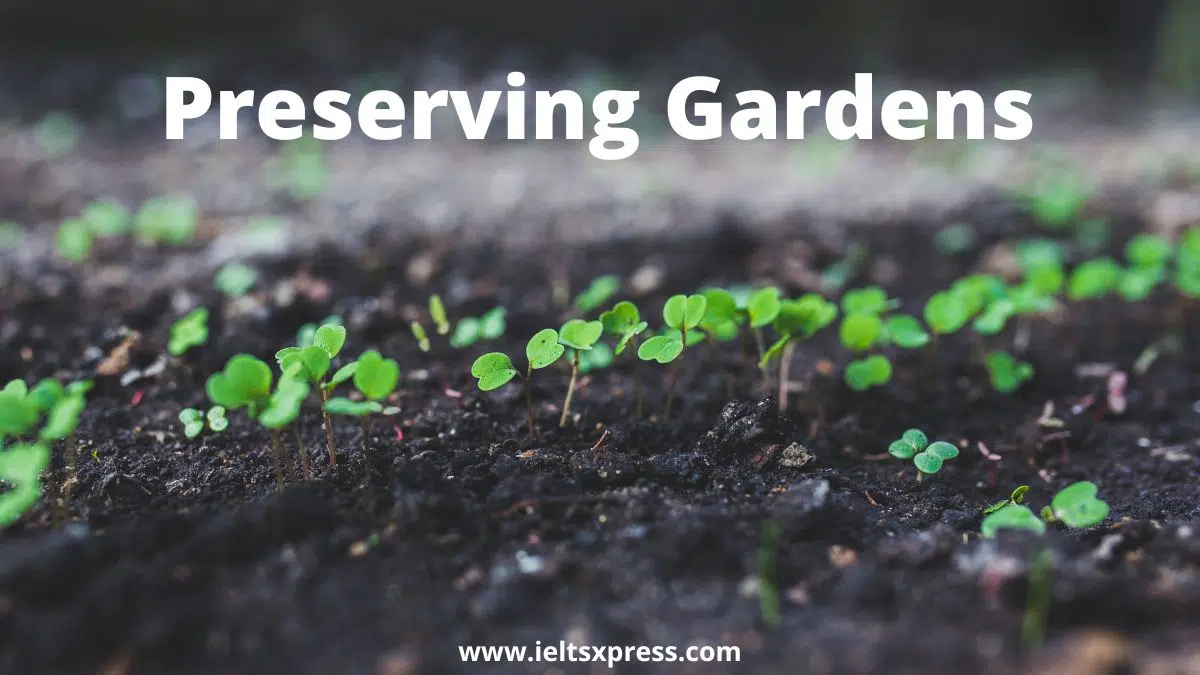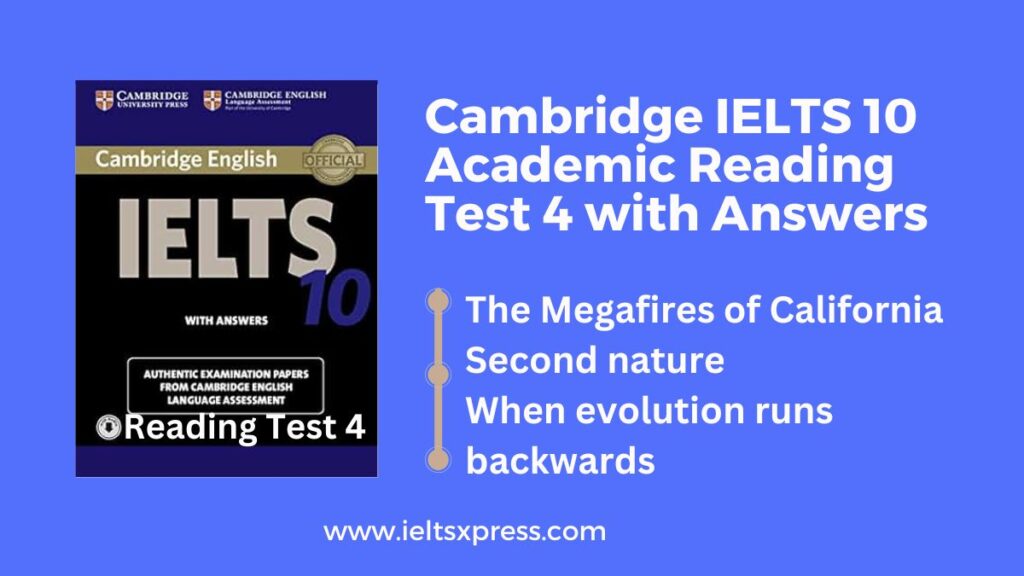Preserving Gardens IELTS Reading Passage with Answers
Reading Passage 2
You should spend about 20 minutes on Questions 14-26 which are based on Reading Passage 2 below.
Real IELTS Exam Question, Reported On:
| India | 4th June 2022 |
Preserving Gardens
A
With a quarter of the world’s plants set to vanish within the next 50 years, Dough Alexander reports on the scientists working against the clock the preserve the Earth’s botanical heritage. They travel the four corners of the globe, scouring jungles, forests and savannas. But they’re not looking for ancient artefacts, lost treasure or undiscovered tombs. Just pods. It may lack the romantic allure of archaeology or the whiff of danger that accompanies going after a big game, but seed hunting is an increasingly serious business. Some seek seeds for profit-hunters in the employ of biotechnology firms, pharmaceutical companies and private corporations on the lookout for species that will yield the drugs or crops of the future. Others collect to conserve, working to halt the sad slide into extinction facing so many plant species.
B
Among the pioneers of this botanical treasure hunt was John Tradescant, an English royal gardener who brought back plants and seeds from his journeys abroad in the early 1600s. Later, the English botanist Sir Joseph Banks – who was the first director of the Royal Botanic Gardens at Kew and travelled with Captain James Cook on his voyages near the end of the 18th century – was so driven to expand his collections that he sent botanists around the world at his own expense.
C
Those heady days of exploration and discovery may be over, but they have been replaced by a pressing need to preserve our natural history for the future. This modern mission drives hunters such as Dr Michiel van Slageren, a good-natured Dutchman who often sports a wide-brimmed hat in the field – he could easily be mistaken for the cinematic hero Indiana Jones. He and three other seed hunters work at the Millennium Seed Bank, an 80 million [pounds sterling] international conservation project that aims to protect the world’s most endangered wild plant species.
D
The group’s headquarters are in a modern glass-and-concrete structure on a 200-hectare Estate at Wakehurst Place in the West Sussex countryside. Within its underground vaults are 260 million dried seeds from 122 countries, all stored at -20 Celsius to survive for centuries. Among the 5,100 species represented are virtually all of Britain’s 1,400 native seed-bearing plants, the most complete such collection of any country’s flora.
E
Overseen by the Royal botanic gardens, the Millennium Seed Bank is the world’s largest wild-plant depository. It aims to collect 24,000 species by 2010. The reason is simple: thanks to humanity’s effort, an estimated 25 per cent of the world’s plants are on the verge of extinction and may vanish within 50 years. We’re currently responsible for habitat destruction on an unprecedented scale, and during the past 400 years, plant species extinction rates have been about 70 times greater than those indicated by the geological record as being ‘normal’. Experts predict that during the next 50 years further one billion hectares of wilderness will be converted to farmland in developing countries alone.
F
The implications of this loss are enormous. Besides providing staple food crops, plants are a source of many machines and the principal supply of fuel and building materials in many parts of the world. They also protect soil and help regulate the climate. Yet, across the globe, plant species are being driven to extinction before their potential benefits are discovered.
G
The world Conservation Union has listed 5,714 threatened species is sure to be much higher. In the UK alone, 300 wild plant species are classified as endangered. The Millennium Seed Bank aims to ensure that even if a plant becomes extinct in the wild, it won’t be lost forever. Stored seeds can be used the help restore damaged or destroyed the environment or in scientific research to find new benefits for society- in medicine, agriculture or local industry- that would otherwise be lost.
H
Seed banks are an insurance policy to protect the world’s plant heritage for the future, explains Dr Paul Smith, another Kew seed hunter. “Seed conservation techniques were originally developed by farmers,” he says. “Storage is the basis what we do, conserving seeds until you can use them just as in farming,” Smith says there’s no reason why any plant species should become extinct, given today’s technology. But he admits that the biggest challenge is finding, naming and categorizing all the world’s plants. And someone has to gather these seeds before it’s too late. “There aren’t a lot of people out there doing this,” he says. “The key is to know the flora from a particular area, and that knowledge takes years to acquire.”
I
There are about 1,470 seedbanks scattered around the globe, with a combined total of 5.4 million samples, of which perhaps two million are distinct non-duplicates. Most preserve genetic material for agriculture use in order to ensure crop diversity; others aim to conserve wild species, although only 15 per cent of all banked plants is wild.
J
Many seed banks are themselves under threat due to a lack of funds. Last year, Imperial College, London, examined crop collections from 151 countries and found that while the number of plant samples had increased in two-thirds of the countries, the budget had been cut in a quarter and remained static in another 35 per cent. The UN’s Food and Agriculture Organization and the Consultative Group on International Agricultural Research has since set up the Global Conservation Trust, which aims to raise the US $260 million to protect seed banks in perpetuity.
Questions 14-19
Do the following statements agree with the information given in Reading Passage 2?
In boxes 14-19 on your answer sheet, write
TRUE if the statement is true
FALSE if the statement is false
NOT GIVEN if the information is not given in the passage
14 The purpose of collecting seeds now is different from the past.
15 The millennium seed bank is the earliest seed bank.
16 One of the major threats for plant species extinction is farmland expansion into wildness.
17 The approach that scientists apply to store seeds is similar to that used by farmers.
18 technological development is the only hope to save plant species.
19 The works of seed conservation are often limited by financial problems.
Questions 20-24
Summary
Complete the following summary of the paragraphs of Reading Passage 2,
Using NO MORE THAN THREE WORDS from the Reading Passage for each answer.
Write your answers in boxes 20-24 on your answer sheet.
Some people collect seeds for the purpose of protecting certain species from 20____________ others collect seeds for their ability to produce 21____________ They are called seed hunters. The 22____________Of them included both gardeners and botanists, such as 23____________, who financially supported collectors out of his own pocket. The seeds collected are usually stored in seed banks, one of which is the famous millennium seed bank, where seeds are all stored in the24____________ at a low temperature.
Questions 25-26
Choose the correct letter, A-E.
Write your answers in boxes 25, 26 on your answer sheet.
Which TWO of the following are provided by plants to the human?
A food
B fuels
C clothes
D energy
E commercial products
Preserving Gardens IELTS Reading Answers
Practice with Expert IELTS Tutors Online
Apply Code "IELTSXPRESS20" To Get 20% off on IELTS Mock Test
14. TRUE
15. NOT GIVEN
16. TRUE
17. TRUE
18. FALSE
19. TRUE
20. extinction
21. drugs, crops
22. pioneers
23. Sir Joseph Banks
24. underground vaults
25. A
26. B
Preserving Gardens IELTS Reading Answers Explanation
Question 14.
Answer: True
Supporting Sentence: Others collect to conserve, working to halt the sad slide into extinction, facing so many plant species.
Keywords: Extinction, Plant species, and Conserve.
Keyword Location: Section A, Line 9. ieltsxpress
Explanation: Yes, the above statement is true as the main aim of collecting seed is to protect it from extinction.
Question 15.
Answer: Not given.
Explanation: The only information written in the passage about The millennium seed bank is that it aims to protect endangered wild plant species.
Question 16.
Answer: False.
Supporting Sentence:Experts predict that during the next 50 years, further one billion hectares of wilderness will be converted to farmland in developing countries alone.
Keywords:Wilderness, and farmland.
Keyword Location:Section E, Line 7.
Explanation:Human expansion is the cause of the destruction of natural habitats. According to the experts, in the next 50 years, one billion hectares of wildland or natural habitat will be converted into farmlands.
Question 17.
Answer: True.
Supporting Sentence: scientific research to find new benefits for society- in medicine, agriculture, or local industry- that would otherwise be lost.
Keywords: Conservation, and Farmers.
Keyword Location: Section H, Line 2.
Explanation: According to Dr. Paul Smith, he says that storing seed is an old-school technique of the farmers. As the farmers used to store seeds of the crop for farming.
Question 18.
Answer: False.
Supporting Sentence:The reason is simple: thanks to humanity’s efforts, an estimated 25 percent of the world’s plants are on the verge of extinction and may vanish within 50 years.
Keywords: Extinction, and Humanity.
Keyword Location: Section E, Line 2. ielts xp res s
Explanation: It is clearly mentioned in the passage that the expansion of human activity and technological advancement is the cause of the extinction of flora from the planet. Around 25% of the flora are on the edge of extinction in the next 50 years.
Question 19.
Answer: True.
Supporting Sentence: There are about 1,470 seed banks scattered around the globe, with a combined total of 5.4 million samples,
Keywords: Banks, and Funds.
Keyword Location: Section J, Line 1.
Explanation: It has been often observed that the task of seed conservation does not receive a good of funds to carry over the activity. The banks are not able to provide adequate funds to the people to continue the work of seed conservation.
Question 20.
Answer: Extinction.
Supporting Sentence: As some people collect plant seeds to make a profit for their firms, but some collect seeds to protect them from extinction. ‘Others collect to conserve, working to halt the sad slide into extinction facing so many plant species.’ (Line 8-9)
Keywords: Conserve, Extinction, and Plant species.
Keyword Location: Section A, Line 8.
Explanation: It has been seen that some people who belong to the industry of pharmaceutical, biotechnology, and private companies used seeds to make a profit. But some conservationists protect these seeds from extinction to protect biodiversity.
Question 21.
Answer: Drugs, crops.
Supporting Sentence: ‘Lookout for species that will yield the drugs or crops of the future.’
Keywords: Drugs, Crops, and Species.
Keyword Location: Section A, Line 8.
Explanation: The private firms use these seeds to make drugs, medicines, or crops which will give profit in the future.
Question 22.
Answer: Pioneers.
Supporting Sentence: Some famous and important personality has brought back seeds from other parts of the world while traveling. ‘Among the pioneers of this botanical treasure hunt was John Tradescant…’ (line 8)
Keywords:Pioneers, and Botanical treasure.
Keyword Location:Section B, Line 1.
Explanation:There are some famous persons who brought back seeds from other countries for the collection of different plant species’ seeds.
Question 23.
Answer: John Tradescant.
Supporting Sentence: ‘John Tradescant, an English royal gardener who brought back plants and seeds from his journeys abroad.’
Keywords: Gardener, and Seeds.
Keyword Location: Section B, Line 2)
Explanation: John Tradescant, a gardener has brought back plants and seeds with himself while travelling around the world to collect various plant species.
Question 24.
Answer: Underground vaults.
Supporting Sentence: The collected seeds were used to store in underground vaults. ‘Within its underground vaults are 260 million dried seeds from 122 countries, all stored at -20 Celsius to survive for centuries.’ (Line 2)
Keywords: Dried seeds, and Underground Vaults.
Keyword Location: Section D, Line 2)
Explanation: The collected seeds from different countries have been stored in underground vaults so that they could survive for many centuries. They were kept at -20 Celsius at underground vaults.
Question 25.
Answer: Food
Supporting Sentence: Besides providing staple food crops, plants are sources of many machines and the principal supply of fuel and building materials in many parts of the world.
Keywords: food crops, machines
Keyword Location: Section F, Line 1-2
Explanation: The plant species provide so many useful materials to humankind. It gives us food, wood, raw material, and fuel to carry out day-to-day activities.
Question 26.
Answer: Fuels
Supporting Sentence: The plants provide humans with food as well as fuel and material. ‘Besides providing staple food crops, plants are a source of many machines and the principal supply of fuel and building materials in many parts of the world.’ ( Line 1-2)
Keywords: Staple food, Machines, and Fuel.
Keyword Location: Section F, Line 2.
Explanation: The plant species provide so many useful materials to humankind. It gives us food, wood, raw material, and fuel to carry out day-to-day activities.
Also Check: The Dugong Sea Cow IELTS Reading Academic





